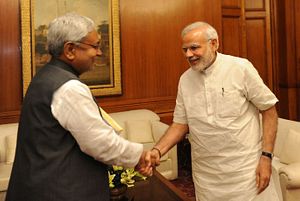India’s ruling Bharatiya Janata Party (BJP), led by Prime Minister Narendra Modi, has conceded defeat in Bihar’s crucial legislative assembly elections. A statewide coalition of three parties known as the Grand Alliance, comprising the Janata Dal (United), or JD(U), the Rashtriya Janata Dal (RJD), and the Indian National Congress, secured a landslide win. The Kumar-led alliance secured 178 seats in the legislative assembly to the BJP-led National Democratic Alliance (NDA) coalition’s 58. The election results were released on November 8. The BJP’s loss in Bihar could ultimately end up slowing down the prime minister’s planned economic reform agenda.
The BJP has conceded defeat in Bihar. Modi spoke with Nitish Kumar and “congratulated him on the victory,” according to a statement shared on social media. Though the result in Bihar signals a challenge to the nationwide popularity of the ruling BJP-led alliance, it is also a sign that Biharis largely approve of Kumar’s governance record in the state. Kumar, the chief minister of the state, has been credited with a strong record on development and corruption. Kumar and Modi have a particularly storied political history; in September 2013, Kumar’s JD(U) split with the Bharatiya Janata Party after Modi was anointed the party’s prime ministerial candidate. In the May 2014 general elections, Kumar’s JD(U)-led alliance was trounced by a nationally dominant BJP. Of 40 available seats, the JD(U) experienced a net loss of 18 Lok Sabha seats in those elections to the BJP’s net gain of 10.
The result is significant for India’s national political scene particularly because state legislators elect members of parliament for the upper house of parliament, the Rajya Sabha. (A small number are directly appointed by the Indian president.) Though the BJP won a historic nationwide mandate in the Lok Sabha, the lower house, in the May 2014 general election, it continues to lack a majority in the Rajya Sabha. Bihar carries political heft in the Rajya Sabha, where it is allotted 16 seats. A legislative election victory could have eventually helped the BJP-led NDA coalition gain a majority in the upper house, supercharging the prime minister’s reform agenda.
The Indian National Congress-led United Progressive Alliance maintains a majority in the Rajya Sabha, but the outcome of the Bihar legislative election could ultimately see the Janata Parivar coalition in the Rajya Sabha expand its presence. In particular, the Rashtriya Janata Dal, a component of the Grand Alliance in Bihar, saw a massive increase in its legislative assembly presence. It currently holds a single Rajya Sabha seat and could gain more going forward.
Beyond the legislative consequences, the results in Bihar highlight the BJP’s political vulnerability. As Shekhar Gupta remarked in the New York Times, “Modi is beatable.” Since May 2014, the BJP has managed to largely hold on to its nationwide grip on power. The party’s late-2014 victories in Jammu and Kashmir and Jharkhand suggested that the BJP was poised to play a greater role in state politics across the country. The outcome in Bihar suggests that this is not likely something that the party can take for granted.
The politics of the recent Bihar legislative elections also raise the question of whether the broader nation-wide debate in India regarding the BJP’s perceived tolerance of rising Hindu extremism played a role in its electoral defeat. Opposition and regional politicians in India, including the Indian National Congress’ Rahul Gandhi and the Trinamool Congress’ Mamata Banerjee, have already cited the outcome in Bihar as a befitting consequence of the BJP’s political proclivities. Whatever the reasons for defeat, the BJP’s politicos will be studying the reasons for the party’s failure in Bihar and will look to potentially recalibrate their electoral strategy moving forward to other important state elections, notably Assam early next year.

































